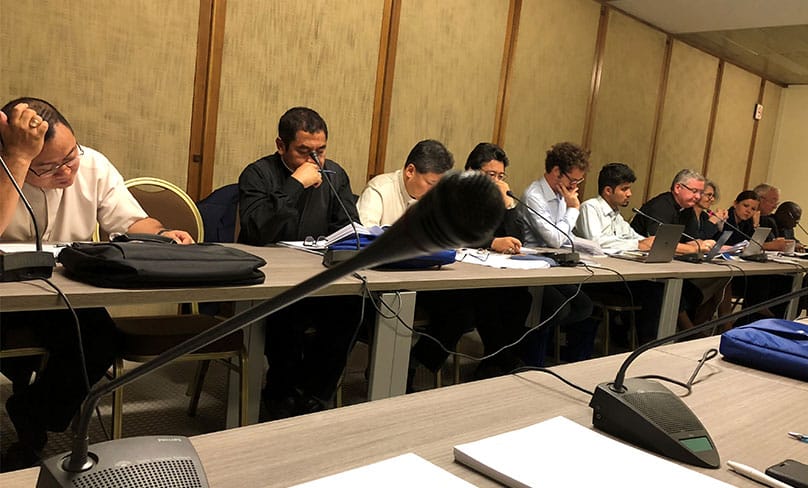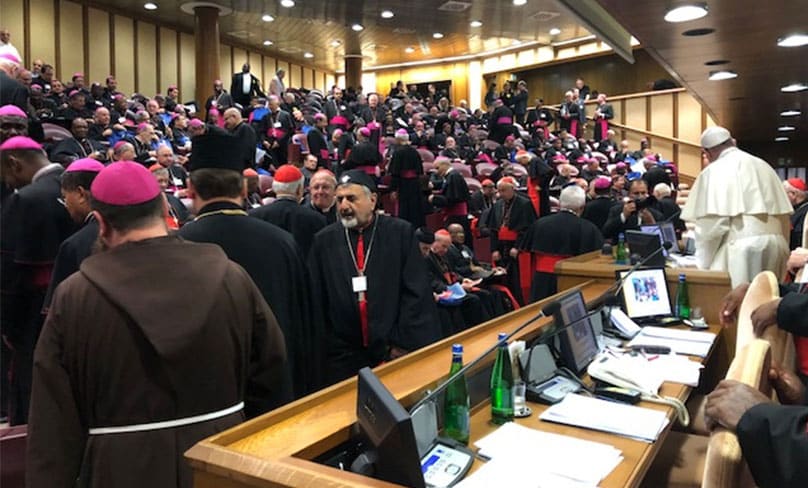
Today we are in our small groups proposing ‘modi’ for the final document of the Synod.
We have a hard week’s work ahead of us, settling the final resolutions and communications from the Synod. In between the formal sessions we’ve had – and will continue to have – interviews, concerts, encounters and, of course, meals (when in Rome…). Yesterday I was filmed for the Vatican News Service and today it will be Rome Reports; yesterday I had morning tea with the Major Archbishop of the Ukrainian Catholics, lunch with the Patriarch of Antioch of the Syrians, and dinner with a delightful group of students from Notre Dame University (the American institution – not the Aussie one)…
Several small group reporters noted that Part 3 is the longest, most complex and confused of the three parts of the Instrumentum Laboris, but unfortunately the Synod has the least time allocated for discussion of this section in small groups and in the general assembly.
Archbishops Vincenzo Paglia (in a wheelchair today), Bruno Forte and Bishop Pietro Fragnelli are the Italian relators, They reported points from the Italian groups:
- Young people demand a simpler, poorer church
- The importance of evangelisation, formation, Eucharist
The Spanish relators are Cardinal José Luis Lacunza Maestrojuán and Archbishop Mariano José Parra Sandoval. Among the observations raised by the Spanish groups were:
- Part 3 of the Instrumentum Laboris seems confused
- We need to rethink parish life
- Accompaniment of the young includes of those of “different sexual orientations”
- The Church needs a greater role for women
- The importance of promoting responsible digital citizenship
- “We propose synodality as the new way of being Church”
The Francophone relators are Bishops Gaspard Béby Gnéba and Laurent Percerou and Dominican Master-General Bruno Cadoré OP. Issues they reported on included:
- The importance of political engagement in order to fight corruption, save the ecology etc
- The need for Catholic media
- The observation that until the whole Church is more deeply converted and more culturally missionary/outgoing, it will not speak to the young
- In place of the present unsatisfactory treatment of sexuality, the Church’s positive teaching on the body, sexuality etc must be stated clearly and persuasively, and pastoral care promised to those who struggle with it
- More emphasis is needed on religious life and the charisms of women

The Anglophone small groups are called “Circuli Anglici A,B,C,D” (which might be translated “Angelic Choirs A,B,C and D”). The relators are Archbishop Eamonn Martin, Bishops Robert Barron, Thomas Dodd and Mark Edwards OMI.
Points made by Angelic Choir A included:
- The need to provide practical resources for the domestic church
- A focus on quality Catholic teacher education and vibrant chaplaincies
- The need for a greater contribution from women, families and young lay leaders in seminary/ religious formation
- The importance of pilgrimages and promotion of piety for young
- The importance of providing prayerful encounters with kerygmatic catechesis for young people
- The importance of providing occasions of art, music, sport, digital media which give the young opportunities to encounter beauty and experience friendship
- A focus on youth involvement in liturgy, movements and associations, parishes and decision-making
- Seeing young people as agents rather than merely objects of the Church’s mission
Angelic Choir B. Observations or points made by this group included:
- The concept of the Church as evangelised and evangelising must frame this part of the Instrumentum Laboris; the reticence of the Instrumentum Laboris in naming Christ is unbecoming
- Needs this group felt were important included: stronger chaplaincy; new models of seminary formation; recruitment, training and support for youth ministers; agreater focus on issues of war, migration, persecution
- Anything the Church does or says on issues of same-sex attraction, gender dysphoria and so on must be consistent with the Catechism
- The Sacrament of Confirmation must be considered in document
Angelic Choir C. Points made by this group included:
- The absence of Christ from most of Part 3 of the Instrumentum Laboris must be corrected; this group also proposed ways in which Jesus can be inserted throughout this part of the document
- Concrete actions regarding the young and vocations are largely matters for local churches, not a worldwide pastoral plan
- The Synod document is not the end of our process of listening, interpreting and choosing
- The importance of the Eucharist and the Christian understanding of carrying the cross
- The importance of serving the young poor…
Angelic Choir D. Among points raised by this groups were:
- The call to holiness and mission of the young must frame this section of the Instrumentum Laboris
- The need for richer treatments of virtue, family, and prayer
- The importance of issuing a summons to young Catholics to become great Catholic politicians, professionals, parents etc
- The power of the liturgy to draw people into a sense of the transcendent: we must not reduce Mass to “a sort of religiously-themed jamboree”
- Digital media is our best way to speak to the ‘nones’ – those who in surveys and polls categorise themselves as having no religious belief – and we should use young people for this work
- The need for local youth synods
- The Church is inclusive whatever a person’s affective orientations; but authentic love wills the true good of the other and so welcome must come along with challenge
The Portuguese language relator is Bishop Joaquin da Silva Mendes SDB. Points he reported included:
- The need for a dialogue mentality; for solidarity with the poor, the importance of care for our common home and accompaniment of the young
- The need to promote a vocational culture, with particular attention to priestly and religious vocations
The relator of the German speaking group is Bishop Stefan Oster SDB. Points and issues he reported included:
- Where will the bishops go regarding justice towards homosexuals, ecological engagement, the role of women in the Church etc?
- This group supported in particular the interventions of Cardinals Nichols and Cupich
- A greater role for women in the Church is essential
- Bishops should fast, pray and give alms to the poor
- A clear declaration against sexual abuse is needed
